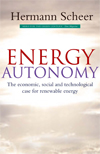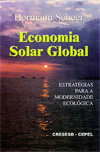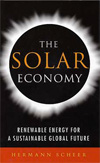 Published in May 2004, Earthscan/James & James, 386 pages, ISBN 1-84407-075-1
Published in May 2004, Earthscan/James & James, 386 pages, ISBN 1-84407-075-1
Renewable Energy for a Sustainable Global Future
"The Solar Economy", by one of the world's most effective analysts and advocates, lays out the blueprints of how political, economic and technological challenges of sustaniable energy can be met using indigenous, renewable and universally available resources, and the enormous opportunities and benefits that will flow from doing so.
The global economy and the way of life it has created are based on the exploitation of fossil fuels – coal, oil and, more recently, natural gas – and fossil fuels will be the engine of the collapse of that economy. Without fundamental change, it has no future. Fossil energy not only threatens massive environmental and social disruption through global warming but, at present rates of consumption, it will run out within decades, causing huge industrial dislocation. Even before then, the conflicts and imbalances it causes in the Middle East and elsewhere in the world’s economy will be frighteningly exacerbated.
The alternative exists: renewable energy from renewable sources – above all solar. Substituting renewable for fossil resources will take a new industrial revolution, which is imperative if the worst of the damage is to be averted, and which also offers an unprecedented chance to restructure the international order, revitalize regional economies and prevent environmental devastation.
It can be done, and it can be done in time. The Solar Economy, by one of the world’s most effective analysts and advocates, lays out the blueprints, showing how the political, economic and technological challenges can be met using indigenous, renewable and universally available resources, and the enormous opportunities and benefits that will flow from doing so.
Quotes
'This book is of the greatest importance for the future of mankind’
Günther Grass, winner of the Nobel Prize for Literature
‘A masterwork by the master advocate for solar’
Jeremy Leggett, author of The Carbon War
'The most powerfully written book on the energy situation. Highly recommended!'
Choice
'Inspirational... Scheer's is a heady, utopian vision. Here comes the sun.'
New Scientist
'Forget Kyoto - all talk and no action; this book shows how technological challenges can be met using indigenous, renewable and universally available resources, and predicts the enormous benefits.'
Energy World
Also available in
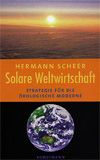 |
- German: Solare Weltwirtschaft. Strategie für die ökologische Moderne. Verlag Antje Kunstmann, München 2000. 344 pages. ISBN 3-88897-228-0. |
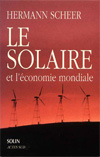 |
- French: Le Solaire et l'économie mondiale. Stratégie pour des temps modernes écologiques. Solin Actes Sud 2001. 384 pages. ISBN 2-7427-3094-X. |
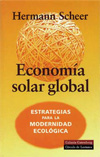 |
- Spanish: Economía solar global. Estrategias para la modernidad ecólogica. Galaxia Gutenberg/Circulo de Lectores 2000. 408 pages. ISBN 84-8109-315-7. |
|
|
- Portugese: Economia Solar Global. Estragégias para a modernidade ecológica. Cresesb - Cepel 2002. 323 pages. ISBN 84-8109-315-7. |
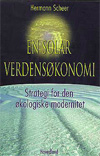 |
- Danish: En solar verdensøkonomi. Strategi for den økologiske modernitet. Forlaget Hovedland 2002. 324 pages. ISBN 87-7739-537-9. |
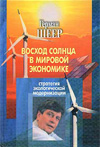 |
- Russian: The Solar Economy. Renewable Energy for a Sustainable Global Future. ISBN 5-94702-002-5. |
 |
- Czech: Světové sluneční hospodářství. Obnovitelná energie pro udrzitelnou globální budoucnost. 2004. 318 pages. ISBN 80-903248-0-0. |
 |
- Japanese: The Solar Economy. Renewable Energy for a Sustainable Global Future. Iwanami Shoten Publishers, Tokyo 2001. 442 pages. ISBN 4-00-005607-7. |
 |
- Chinese: The Solar Economy. Renewable Energy for a Sustainable Global Future. |
Contents
Foreword
Acknowledgements
List of acronyms and abbreviations
Scenario
From fossil fuels to solar power: transforming the global economy
The power of the pyromaniacs
Fossil resource dependency: how economic processes have come adrift from their environmental and social bases
Global competition in place of global environmental policy
The origins of the fossil-fuel economy
Accelerating change and global displacement
Business unbound: cutting loose from nature and society
Reconnecting business and society through solar resources
From the political to the economic solar manifesto
PART I
CAPTIVITY OR LIBERATION: FOSSIL FUEL AND SOLAR SUPPLY CHAINS COMPARED
Chapter 1
Ensnared by fossil supply chains
Long supply chains due to limited resources: the logic of globalization
Fossil resource supply chains and industrial concentration: market destruction through market mechanisms
The spider in the web: the growing influence of Big Energy and Big Mining
The convergence of power: networking, supercartels and the disempowerment of democratic institutions
Chapter 2
Exploiting solar resources: the new political and economic freedom
The solar supply chain
The economic logic of the solar energy supply chain
Solar power: technology without technocracy
PART II
THE PATHOLOGICAL POLITICS OF FOSSIL RESOURCES
Chapter 3
The 21st century writing on the wall: the political cost of fuel and resource conflict
A world in denial: the disregard for limited reserves
Dwindling reserves versus worldwide growth in demand
Arming for the resource conflict
Resource reserves, gunboat diplomacy and the moral bankruptcy of society
Chapter 4
The distorting effects of fossil supply chains
The rise and fall of the fossil city
The fossil resource trap closes on the developing world
Chapter 5
The mythology of fossil energy
Figures of fancy: the inadequacy of conventional energy statistics
The inadequacy of energy forecasts
The profligate subsidies for conventional energy systems
The feigned productivity of nuclear and fossil energy
Ideology and the physics of energy
The fear of the small scale
PART III
THROWING OFF THE FOSSIL SUPPLY CHAINS
Chapter 6
Energy beyond the grid
Wireless power: the potential of solar stand-alone and stand-by technologies
The potential for natural and technological solar energy storage
Synergistic applications, cross-substitution and all-load micro-power plants
The solar technology revolution and the solar information society
Chapter 7
The untapped wealth of solar resources
The higher productivity of biological materials
Replacing fossil with solar resources
Solar materials: from agricultural monocultures to polycultures
The real biotechnology: materials science, not genetic engineering
Chapter 8
The profitability of renewable energy and resources
Whose costs? Why solar and fossil resources cannot be compared on the basis of economic efficiency calculations
Cost avoidance: economical application of solar resources in a nutshell
PART IV
TOWARDS A SOLAR ECONOMY
Chapter 9
Exploiting solar energy
The role of capital allowances - and their problems
Tax-exempt status for solar resources: overcoming the legitimacy crisis of environmental taxation
Possibilities and problems in the market for green electricity
Green suppliers and municipal self-sufficiency
Creative destruction in the energy industry and the transformation of the resource industry
Hard roads to soft resources
Chapter 10
Regionalization of the global economy through solar resources
Regionalization effects through solar resources
'Own implementation' versus 'joint implementation': opportunities for the developing world
Regionalizing trade flows
The sustainable economy: global technology markets, regional commodity markets
Trade not talk: beyond the energy industry
Chapter 11
The visible hand of the sun: blueprint for a solar world
Forwards: towards the primary economy
Work and the solar economy
From the bounty of the sun to global economic prosperity


